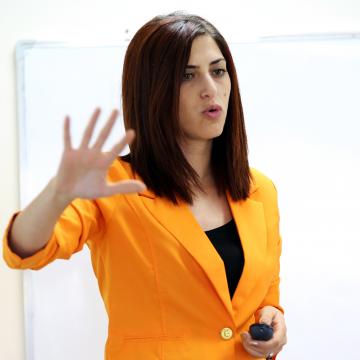In 2013, former Simmons faculty member Areen Shahbari ’11MBA, ’11C (Entrepreneurship Certificate) established Cactus International, which has provided hundreds of consultation sessions and dozens of courses, workshops, and lectures on entrepreneurship for Arab and Middle Eastern women. More than two-thirds of the women who participated in the Cactus Entrepreneurship courses have established and developed their own businesses, and women consist of 80% of their total employees.
We recently spoke to Shahbari about her time at Simmons and what inspired her to found Cactus.
What led you to study at Simmons?

I was born in Nazareth — I’m Palestinian. I grew up seeing that women were not getting the opportunities they deserved. The systems and culture in place were not letting them reach their potential. In high school, I dreamed of working for a TV channel, and during my third year of college, I worked at the top-rated TV channel in the country.
Years later, as head of Arabic programming, I hosted two television shows focused on women. I was focused on empowering women through the media, inspiring women to take on leadership roles to be influential in society. I wanted to start a TV channel dedicated to women in the Middle East and North Africa (MENA) regions.
To move toward my goals, I needed a master’s degree. When I received a Fulbright scholarship, Fulbright chose Simmons for me. I didn’t know anything about Simmons. I thought, “It’s an all-women’s school — is it religious?” I didn’t want to go to a religious school! Then I read about Simmons and its focus on women in business. Since my application was all about my dedication to empowering women, the Fulbright choice of Simmons made so much sense. The experience at Simmons showed me that it was the best fit for me.
I concentrated in entrepreneurship at Simmons and had a great experience. Still focused on my idea of a TV channel, I conducted market research on Arab and Middle Eastern women and found that 70% of them didn’t participate in the workforce, though they were more educated than men. I began to wonder if a TV channel would really make the impact I intended. I wanted women to be leaders in this world and knew that they needed to gain financial independence for this to happen.
I found reports of gender discrimination by employers, and that is where the idea for Cactus International was born. I needed to find ways to give women the tools and skills they need to start a business from scratch, to lead it themselves, and to hire other women for the greatest social impact.
I wanted women to be leaders in this world and knew that they needed to gain financial independence for this to happen.
How did you launch Cactus International?
The first courses began in Nazareth in February 2013, and women were driving from all over the country to attend weekly classes. I taught women how to build a business plan and create a business pitch to share with potential investors. One of the reasons I was able to spread this message was the large network I had in the media industry, who helped me promote Cactus.
Focusing on women's entrepreneurship was not common in the Middle East at that time. Women were often encouraged to start small businesses to help them out in dire financial situations. They were told to start something small at home to help the family. Once the man was able to earn the income needed, the woman would stop her business. It wasn’t about women or entrepreneurship.
I started Cactus as a business, not an NGO [Non-Governmental Organization], because I wanted to be a business leader and be credible to the women I was teaching. I wanted the concept of women in leadership to be about skill and ambition and hiring other women. I did not want to depend on donors — I wanted to create value for women. I believed that if I proved the value women received from attending my courses, they would pay for them. That is how Cactus took off and how it became successful.
What challenges did you face when you launched Cactus?
I had a strong background in the media industry, not in business. To increase the credibility of my courses, I brought well-known businesswomen, businessmen, lawyers, marketers, and investors, to cover certain aspects of the course. They happily did and offered to come back and do more as they wanted to be part of the Cactus mission. At first, I only taught a couple of sessions but received feedback that I was good at training and that I should teach most of the course, and so I did. I continued training and consulting women on-site until 2014.
In 2014, I secured my green card and returned to the US to teach at Simmons University School of Business. Later I worked at the MIT Martin Trust Center for Entrepreneurship and Harvard University Extension School. We transitioned Cactus courses online during that time, which enabled me to expand the business beyond Palestinian women.
The online sessions were attended by women from the United Arab Emirates, Jordan, and Palestine, as well as Canada, Singapore, Germany, and the US. We offered multiple courses — negotiations for women, marketing, strategy, building a business plan — and covered all aspects of starting a business.
My team had a strong strategy that focused on a niche: women who were educated, had work experience, were ambitious, and committed to starting a business. It wasn’t about quantity, but quality — over 70% of our graduates start businesses or grow their current businesses. The high success rate is due to creating customized courses that focus on women from the MENA region and their cultural, psychological, and social challenges.
What I created with Cactus was based on my experience studying for my MBA at Simmons. It was a healthy environment, full of ambitious, super-competitive women who were also very supportive of each other. At Simmons, I had such support from my fellow students and the faculty — I had never had such an experience in my life. That inspired me to do the same with Cactus. That is also why Cactus is only for women, to allow women to connect and generate that supportive energy, just like I experienced at Simmons.
At Simmons, I had such support from my fellow students and the faculty — I had never had such an experience in my life.
What leadership skills did you learn while at Simmons?
Simmons taught me many things, including how to lead by my core values and be a role model. I learned how to negotiate, deal with pushback, and manage how I’m perceived through body language and tone of voice. I graduated feeling confident to start my business and to excel in a male-dominated field.
What advice would you give future entrepreneurs?
Take courses on entrepreneurship. You need to know the market, strategize, and learn all the different aspects of starting a business. A business plan forces you to think of all the different sides of your business; this is crucial, so you know how to adapt. You can’t focus solely on the product. You have to understand sales, customer service, management, operations, marketing, and finances.
Entrepreneurship is about taking a risk, but the more you understand what it takes to start a business, the more you can strategize, pivot, and adapt. And remember: the business might fail, but you will never fail. The experience of starting a business, whether the business succeeds or fails, will teach you so much, it will accelerate your learning curve more than anything else in life.
If I could do things differently, I would have chosen to start my business with a co-founder who complements my skills! If I did, I believe my business would have grown at a faster rate than it did. Also, entrepreneurship can be lonely. You need someone to support you, someone you can talk to without worrying about lowering employee morale. Find someone with skills that complement yours. Research finds that investors are more likely to invest in a business with more than one founder, increasing the overall success rate.

